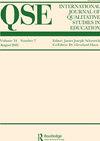“Play my clip!”: arts-mediated agency in disability-centered learning and research
IF 1.1
Q3 EDUCATION & EDUCATIONAL RESEARCH
International Journal of Qualitative Studies in Education
Pub Date : 2023-09-28
DOI:10.1080/09518398.2023.2264243
引用次数: 0
Abstract
AbstractThe widespread myth that adults with intellectual disabilities lack agency still pervades learning and research spaces, justifying ableist teaching and research methods. Bringing critical, socio-cultural perspectives on disability together with Disability Justice principles, I present a joyful counternarrative, illustrating how a group of adults with intellectual disabilities exercised agency in and through one drama-based learning and research context. Using data generated through participant observation, group interviews, and analysis of short films, I illustrate how characteristics of this drama-based context—creativity, flexibility, multimodality, and supportiveness—afforded disabled participants’ interdependent agency. I explore tensions that arose during research regarding the nature of truthfulness, “good” storytelling, and systems of power. Results suggest an argument for the arts in learning and research with disabled participants, grounded not in their therapeutic benefit but in their capacity to afford agency, with implications for teachers and researchers looking to engage disabled participants in emancipatory work.Keywords: Disability justiceagencydisability studies in educationtheater and dramaarts-based pedagogy AcknowledgementsThank you to Drs. Margaret A. Beneke, Katherine E. Lewis, and Molly Shea, and my fellow doctoral students in the UW College of Education for providing invaluable mentorship throughout this research process. Thank you to Northwest Drama’s staff, volunteers, and most importantly CLAP participants without whose wisdom this work would not exist.Ethical approvalThe work in question was submitted for review to the University of Washington IRB. In accordance with federal guidelines, the IRB determined that the work did not fall within its purview and required no further review.Disclosure statementThe author reports there are no competing interests to declare.Notes1 I use person-first and identity-first language interchangeably to honor the disability community’s diverse language preferences.2 “A system of assigning value to people’s bodies and minds based on societally constructed ideas of normalcy, productivity, desirability, intelligence, excellence, and fitness… deeply rooted in eugenics, anti-Blackness, misogyny, colonialism, imperialism, and capitalism” (Lewis, Citation2022).3 Following Schalk (Citation2018), I use “bodyminds” to indicate the “the inextricability of mind and body” (p. 5).4 I follow Linton (Citation1998) and identify as “nondisabled” to strategically center disability. While I recognize that disability is a permeable and ever-shifting identity that gains its meaning from sociocultural context, I do not at this point in my life identify as a member of the disability community.5 All names in this paper have been changed to protect participants’ anonymity.Additional informationNotes on contributorsMaddie N. ZdeblickMaddie N. Zdeblick (she/her) is a Seattle-based teaching artist, director, and PhD student in education at the University of Washington Seattle. Maddie’s research focuses on exploring new approaches to transformative arts education with disabled students through critical qualitative research methods which foreground Disability Justice perspectives. Maddie holds a master’s degree in Education from UW Seattle, a bachelor’s degree in Theater and Sociology, with a focus in Theater for Young Audiences, from Northwestern University, and is a 2019 graduate of the Washington State Teaching Artist Training Lab.“播放我的片段!”:以残疾为中心的学习和研究中的艺术中介代理
摘要成人智障人士缺乏能动性的误解在学习和研究领域仍然普遍存在,这为智障主义的教学和研究方法提供了理由。我将对残疾的批判性、社会文化视角与残疾正义原则结合在一起,提出了一个令人愉快的反叙事,说明了一群智力残疾的成年人如何在一个基于戏剧的学习和研究背景下行使自己的权力。通过参与者观察、小组访谈和短片分析产生的数据,我说明了这种基于戏剧的情境的特征——创造性、灵活性、多模态和支持性——如何为残疾参与者提供相互依赖的代理。我探索在研究过程中出现的关于真实性的本质、“好的”讲故事和权力体系的紧张关系。结果表明,与残疾参与者一起学习和研究艺术的论点,不是基于他们的治疗效益,而是基于他们负担得起的代理能力,这对希望让残疾参与者参与解放工作的教师和研究人员有启示。关键词:残疾司法机构残疾教育研究戏剧与戏剧教学法Margaret A. Beneke, Katherine E. Lewis和Molly Shea,以及我在西澳大学教育学院的博士同学们,感谢他们在整个研究过程中提供了宝贵的指导。感谢西北戏剧的工作人员,志愿者,最重要的是CLAP参与者,没有他们的智慧,这项工作就不会存在。伦理审批该工作已提交华盛顿大学伦理委员会审查。根据联邦指导方针,内部审查委员会确定这项工作不属于其职权范围,不需要进一步审查。披露声明作者报告无竞争利益需要申报。注1:我交替使用个人优先和身份优先的语言,以尊重残疾人群体不同的语言偏好“一种基于正常、生产力、可取性、智力、卓越和健康等社会建构的观念为人们的身体和思想赋予价值的体系……深深植根于优生学、反黑人、厌女症、殖民主义、帝国主义和资本主义”(Lewis, Citation2022)继沙尔克(Citation2018)之后,我使用“身心”来表示“身心的不可分割性”(第5页)我跟随林顿(Citation1998),将“非残疾”定位为战略性地以残疾为中心。虽然我认识到残疾是一种可渗透的、不断变化的身份,它从社会文化背景中获得了它的意义,但在我的生活中,我并不认为自己是残疾群体的一员为保护参与者的匿名性,本文中的所有姓名均已更改。maddie N. Zdeblick(她/她)是西雅图的教学艺术家、导演和西雅图华盛顿大学教育学博士生。Maddie的研究重点是通过批判性的定性研究方法探索残疾学生的变革性艺术教育的新方法,这些方法将残疾正义的观点置于前景。Maddie在西雅图大学获得教育学硕士学位,在西北大学获得戏剧和社会学学士学位,专注于年轻观众的戏剧,并于2019年毕业于华盛顿州教学艺术家培训实验室。
本文章由计算机程序翻译,如有差异,请以英文原文为准。
求助全文
约1分钟内获得全文
求助全文
来源期刊

International Journal of Qualitative Studies in Education
EDUCATION & EDUCATIONAL RESEARCH-
CiteScore
2.90
自引率
9.10%
发文量
123
期刊介绍:
The aim of the International Journal of Qualitative Studies in Education (popularly known as QSE) is to enhance the practice and theory of qualitative research in education, with “education” defined in the broadest possible sense, including non-school settings. The journal publishes peer-reviewed empirical research focused on critical issues of racism (including whiteness, white racism, and white supremacy), capitalism and its class structure (including critiques of neoliberalism), gender and gender identity, heterosexism and homophobia, LGBTQI/queer issues, home culture and language biases, immigration xenophobia, domination, and other issues of oppression and exclusion.
 求助内容:
求助内容: 应助结果提醒方式:
应助结果提醒方式:


